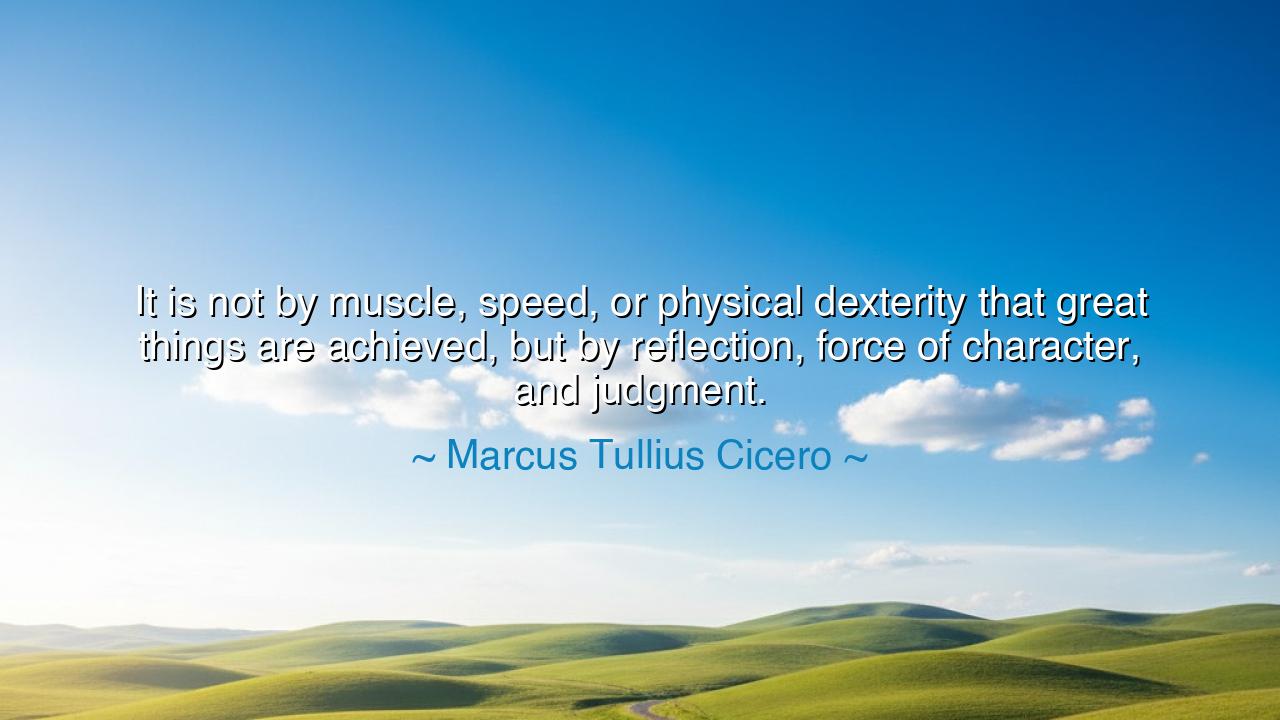
It is not by muscle, speed, or physical dexterity that great
It is not by muscle, speed, or physical dexterity that great things are achieved, but by reflection, force of character, and judgment.






The words “It is not by muscle, speed, or physical dexterity that great things are achieved, but by reflection, force of character, and judgment” were spoken by Marcus Tullius Cicero, one of Rome’s greatest orators, philosophers, and defenders of the Republic. In this single sentence, Cicero crystallizes the eternal truth that true greatness is not born of strength of body, but of strength of mind and spirit. Though the Roman world worshipped the might of legions and the valor of soldiers, Cicero, ever the statesman of thought, reminded his people that the fate of nations and the triumph of civilizations rest not upon the sword, but upon the wisdom that wields it.
To say that greatness is not achieved by muscle or speed is to turn away from the illusions of power that dazzle the unwise. The body, no matter how mighty, is perishable; its victories fade with time, its glory withers with age. But reflection, character, and judgment — these are the weapons of the eternal mind. The thinker, the judge, the visionary — they shape empires without lifting a blade. Cicero lived in an age of warlords and generals, yet he dared to proclaim that the most enduring victories are those won by the intellect. Where soldiers conquer lands, wisdom conquers time.
The origin of Cicero’s words lies in the tumult of his own life. He lived during the fall of the Roman Republic, a time when brute strength and ambition were tearing apart the very foundations of the state. Men like Caesar and Pompey commanded legions, while Cicero wielded only words — yet his words were powerful enough to still armies, to sway senators, and to stir the conscience of Rome. He believed that a society survives not through violence, but through virtue — the moral strength of its citizens. Reflection gives vision, judgment gives direction, and character gives endurance. When these three unite, no empire, no matter how mighty, can stand against their power.
Consider the tale of Pericles of Athens, who centuries before Cicero, understood this same law of greatness. In an age when Sparta’s armies ruled the land through force and fear, Pericles led his people through the power of thought and persuasion. He built not only walls and fleets, but ideas — ideals of democracy, justice, and civic duty that would echo through the ages. He proved that wisdom outlasts warfare, that a city built on intellect and integrity endures longer than one built on conquest. Just as Pericles guided Athens with mind and character, so Cicero sought to guide Rome, believing that reason and virtue were the true foundations of strength.
Cicero’s words also reveal a profound understanding of human nature. The strong man may dominate for a time, but he cannot sustain his rule without wisdom. The quick may win the race, but without judgment, he will run toward ruin. And the skillful may charm for a moment, but without character, his craft collapses at the first trial. Reflection allows one to see the truth before acting; judgment allows one to choose rightly; character allows one to persevere when the path grows dark. Together, they form the triad of greatness that no physical strength can replace.
In every age, the pattern repeats. The mightiest empires fall when their leaders forsake reflection for pride, character for greed, and judgment for impulse. The walls of Troy, the palaces of Persia, the towers of Rome — all crumbled when wisdom gave way to arrogance. But the legacies of Socrates, Confucius, and Cicero endure, for their empires were not of stone or steel, but of thought and principle. These are the true builders of history — those who lead not by domination, but by discernment, who act not from impulse, but from insight.
The lesson, then, is clear and timeless: seek not to be powerful in body alone, but in spirit. Strength of limb fades; strength of mind ascends. Cultivate reflection, that you may see the world clearly; nurture character, that you may stand firm in adversity; refine judgment, that your actions may bring harmony instead of chaos. Do not rush as the reckless do, nor boast as the strong do, but move with the calm authority of one who understands. For the world is not conquered by those who strike hardest — it is guided by those who think deepest.
So, my children, remember Cicero’s wisdom: the body is a vessel, but the mind is the captain. The muscles may lift stones, but it is wisdom that builds temples; the hand may wield the sword, but it is judgment that wins the war. Let your strength be rooted in virtue, your courage in understanding, and your triumph in the clarity of thought. For it is by reflection, by character, and by wise judgment that the greatest of all victories are won — the victory of the soul over ignorance, and the victory of truth over time itself.






AAdministratorAdministrator
Welcome, honored guests. Please leave a comment, we will respond soon